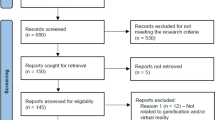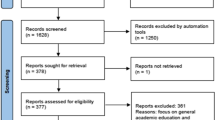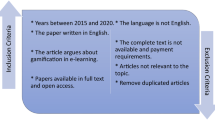Abstract
The purpose of this manuscript is to report our experience in the 2021 SIIM Virtual Hackathon, where we developed a proof-of-concept of a radiology training module with elements of gamification. In the 50 h allotted in the hackathon, we proposed an idea, connected with colleagues from five different countries, and completed an operational proof-of-concept, which was demonstrated live at the hackathon showcase, competing with eight other teams. Our prototype involved participants annotating publicly available chest radiographs of patients with tuberculosis. We showed how we could give experience points to trainees based on annotation precision compared to ground truth radiologists’ annotation, ranked in a live leaderboard. We believe that gamification elements could provide an engaging solution for radiology education. Our project was awarded first place out of eight participating hackathon teams.






Similar content being viewed by others
References
OpenBSD Hackathons. Available at https://www.openbsd.org/hackathons.html. Accessed June 8, 2021.
MIT Hackathon. Available at https://news.mit.edu/topic/hackathon. Accessed June 8, 2021.
DePasse JW, et al.: Less noise, more hacking: how to deploy principles from MIT's hacking medicine to accelerate health care. Int J Technol Assess Health Care 30:260-264, 2014
Walker A, Ko N: Bringing Medicine to the Digital Age via Hackathons and Beyond. J Med Syst 40:98, 2016
Poncette A-S, Rojas P-D, Hofferbert J, Valera Sosa A, Balzer F, Braune K: Hackathons as Stepping Stones in Health Care Innovation: Case Study With Systematic Recommendations. Journal of medical Internet research 22:e17004, 2020
Aungst TD: Using a hackathon for interprofessional health education opportunities. J Med Syst 39:60, 2015
Wang JK, Roy SK, Barry M, Chang RT, Bhatt AS: Institutionalizing healthcare hackathons to promote diversity in collaboration in medicine. BMC Med Educ 18:269, 2018
SIIM Hackathon website. Available at https://siim.org/page/hacking_healthcare. Accessed June 8, 2021.
Castelblanco A, Semin A, Marques O, Folio LR, Do HM: Medical Imaging Annotation Game as a Dataset Crowdsourcing Incentive: Initial Development at the SIIM19 Hackathon, 2020
Awan O, et al.: Making Learning Fun: Gaming in Radiology Education. Academic radiology 26:1127-1136, 2019
Reiner B, Siegel E: The potential for gaming techniques in radiology education and practice. Journal of the American College of Radiology : JACR 5:110-114, 2008
Winkel DJ, Brantner P, Lutz J, Korkut S, Linxen S, Heye TJ: Gamification of Electronic Learning in Radiology Education to Improve Diagnostic Confidence and Reduce Error Rates. AJR American journal of roentgenology 214:618-623, 2020
VGG Image Annotator (VIA). Available at https://annotate.officialstatistics.org. Accessed June 8, 2021.
Streamlit website. Available at https://docs.streamlit.io/en/stable/. Accessed June 8, 2021.
SIIM21 Session 6013 Hackathon Project Showcase. Available at https://www.youtube.com/watch?v=jGIMpbc8AwM&t=5101s. Accessed June 8, 2021.
2021 Virtual Hackathon Awards. Available at https://siim.org/general/custom.asp?page=aw_hackathon. Accessed June 8, 2021.
Acknowledgements
The authors thank all 14 participants of our hackathon team. Participants: Pedro V. Staziaki, Stacy O'Connor, Jane Dimperio, Lillian Spear, Michael Do, Lucas Folio, Eduardo Farina; Mentor: Les R. Folio; Domain expert: Brad Genereaux; Code-heros: João A. A. Santinha, Diego Angulo, Marcelo O. Coelho, Mike Ciancibello, and Sivaramakrishnan Rajaraman.
Funding
Not applicable.
Author information
Authors and Affiliations
Contributions
P.V.S conceived the idea and presented it at the SIIM event. J.A.A.S., M.O.C., and D.A. worked in programming the software. L.F. supervised the project, gave more ideas, and supplied the cases and ground-truth. All authors helped in writing the manuscript and reviewed the final version.
Corresponding author
Ethics declarations
Ethics Approval
Not applicable.
Consent to Participate
Not applicable.
Consent for Publication
Not applicable.
Competing Interests
Pedro V. Staziaki’s - Committee: Member of the SIIM Hackathon Committee; João A. A. Santinha’s - Committee: Member of the SIIM Clinical Data Informaticist Task Force; Marcelo O. Coelho’s - Committee: Member of the SIIM Hackathon Committee; Les Folio’s - Boards, Committees: Member at large, SIIM board of directors; Advisory board, Carestream Health; Co-chair of the SIIM Hackathon Committee; Chair, fellowship committee, Society of Advanced Body Tomography; Radsite standards committee on Cone Beam Computed Tomography; Patent (no royalties): “Radiographic marker that displays upright angle on portable x-rays.” US Patent 9,541,822 B2; Patent (no royalties): “Multigrayscale Universal CT Window.” US Patent 8,406,493 B2; Research agreement, Philips Healthcare; Author royalties, Springer; Dr. Folio is supported in part by the NIH Clinical Center Intramural Research Program. Mohannad Hussain’s - Committee: Member of the SIIM Hackathon Committee; Principal Consultant, Techie Maestro Inc.; Technical Project Manager, SIIM Hackathon.
Additional information
Publisher's Note
Springer Nature remains neutral with regard to jurisdictional claims in published maps and institutional affiliations.
Appendices
Appendix
SIIM Hackathon
The annual SIIM Hackathon features servers with current open-source industry standards such as FHIR (the “Fast Healthcare Interoperability Resources” standard) and DICOMweb (the DICOM [Digital Imaging and Communications in Medicine] Standard for web-based medical imaging), in addition to the SIIM dataset, a synthetic dataset that combines clinical data and images, making it easy for beginners and experienced informaticians to utilize and test their prototypes with life-like data (devoid of personal health information) compared to the typical datasets found online which usually feature either clinical data or images but not both [1]. Additional resources include other APIs featuring other international standards such as IHE Standardized Operational Log of Events (SOLE) and IHE Artificial Intelligence Workflow in Imaging (AIW-I) and support staff to manage the otherwise complex systems. Lastly, the SIIM hackathon committee has a diverse team of coders, engineers, physicians, and young members that guide the development and support of the hackathon.
The SIIM Hackathon prides itself on reflecting SIIM’s values of collaboration, education, and advancement of patient care vs. the typical competitiveness of a hackathon. Additionally, participants are asked to consider open sourcing their projects for the benefit of the wider community. In addition to providing servers and datasets, the hackathon offers easy-to-follow start guides for those new to FHIR and DICOMweb and encouraged live dialogue between participants and mentors alike, helping each other overcome obstacles and forging friendships.
Finally, participants are invited to present their prototypes at the annual showcase during the SIIM annual meeting irrespective of how mature the prototypes are, as the focus is on the merit of the idea or problem being solved. The SIIM hackathon has collaborated with several societies such as the American College of Radiology (ACR), Radiological Society of North America (RSNA), Medical Imaging & Technology Alliance (MITA, the standard body behind DICOM), and HL7 International’s FHIR DevDays.
References (Appendix)
1. Kohli M, et al.: Creation and Curation of the Society of Imaging Informatics in Medicine Hackathon Dataset. Journal of digital imaging 31:9–12, 2018
Rights and permissions
About this article
Cite this article
Staziaki, P.V., Santinha, J.A.A., Coelho, M.O. et al. Gamification in Radiology Training Module Developed During the Society for Imaging Informatics in Medicine Annual Meeting Hackathon. J Digit Imaging 35, 714–722 (2022). https://doi.org/10.1007/s10278-022-00603-0
Received:
Revised:
Accepted:
Published:
Issue Date:
DOI: https://doi.org/10.1007/s10278-022-00603-0




